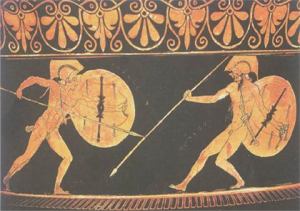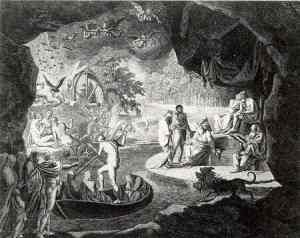The thematic ties between kleos (fame) and nostos (return) within the Odyssey starkly differentiate the character of Odysseus from his Achaean comrades, Achilles and Agamemnon. To begin with, all three characters are involved in the events of both Homeric epics, which each have its own thematic interpretation of kleos and nostos. This means that a different light is shed on the individual glory and return of these characters when they appear in each story. Before the specific glories and returns of these three Greeks can be compared and contrasted, the very Homeric ideas of heroic glory and the return home need to be analyzed first.
An epic poem set in the final year of the historically groundbreaking Trojan War, the Iliad asks and answers many questions concerning the nature of the men that fight in war. The actual story of the poem focuses on the rage of Achilles at the Achaean commander Agamemnon over lost spoils of war. Odysseus also takes part in the action as one of the Greek commanders, although his main contribution during the Trojan War effort takes place after the events of the Iliad conclude. In the end, Achilles gives up the murdered body of Hector only when Priam, the king of Troy himself, begs to be allowed to bury his son. This brings up themes of honor in life, glory in death, and the roles of enemies. What the Iliad doesn’t show, but we learn in the Odyssey, is that Achilles is also killed in the taking of Troy. The war epic finds this appropriate for a great warrior, and Achilles’ Iliadic kleos stems from this death.
After the war, Agamemnon sails home a hero, but we also learn in the Odyssey that he is murdered at the hands of his wife, Clytemnestra, and her lover, Aegisthus. This situation is the reversal of Achilles’: the warrior dies in the field gaining glory but losing his chance to return home. This time the fatal ending to his nostos has robbed Agamemnon of his ultimate kleos. He dies a foolish cuckold rather than a conquering king. Neither epic puts a positive spin on this death as the Iliad does for Achilles, but we can find many similarities and differences between the two of them and Odysseus.
This brings us to Odysseus, the man of many epithets. The surface detail that distinguishes him from his rivals for the particular epithet, “best of the Achaeans,” is that he survives until a ripe old age. He provides the advantage that wins the Trojan War, and he isn’t killed in the Odyssey despite the best efforts of the gods, monsters, and suitors that prevent his nostos. He achieves both kleos and nostos in the end and doesn’t have to die for either. This is partly due to the interpretation of both themes in the Odyssey as opposed to the Iliad. Achilles’ glory stems from his premature death on the battlefield, which he freely chooses over any sort of return. Odysseus avoids death at all costs because his nostos is most important to him, but he still gains great kleos from living through all his deeds. When Odysseus meets the shade of Achilles in Hades, the slain soldier declares that he would rather be a slave on earth than a ruler among the dead (Od. Xi. 556-558). The Odyssey reverses the theme of a glorious soldier’s death in this passage by having its paradigm (Achilles himself) despair at the very thing that brought him Iliadic kleos. Kleos isn’t as important to Odysseus as it is to Achilles, and therein lays the strongest difference between them: Achilles dies for kleos, while Odysseus lives for nostos. His focus on his family and home give him glory and therefore receives kleos when he doesn’t ask for it.
Odysseus also meets the shade of Agamemnon in Hades and learns of his terrible fate. Agamemnon has much more in common with the king of Ithaca, but the differences serve to teach important lessons to the wandering hero. Agamemnon arrives home at Mycenae with less trouble than Odysseus, but faces a trial that in Odysseus’ experience becomes the conclusion of the epic. Agamemnon is the victim of his wife’s betrayal and her lover’s trickery; he is fooled and unloved and doesn’t die like a king. His return erases his glory. The similarities between the two men are clear: Odysseus yearns for home and doting wife as does Agamemnon, and both are beset by the men vying for that wife’s attention. The clear difference is the result: Clytemnestra has given in to lust and taken part in her own husband’s murder, while Penelope remains faithful and defies all suitors.
Further differences are made clearer by looking at Odysseus’ Homeric epithets. As a man “of many devices,” Odysseus overcomes many of his trials by deceit and cleverness. In his final challenge, he fools all of the suitors and Penelope herself before revealing his identity and slaughtering the unwelcome guests. He is the deviser rather than the victim of a scheme that brings him victory, and the devotion of his wife completes that victory as she rejoices to see him returned. The epithet “sacker of cities” creates a paradoxical difference between Odysseus and Agamemnon because they both did take part in the sacking of Troy and have kleos from that event. But Odysseus earned that title as the author of the instrument of the sacking; Demodocus sings the story of the Trojan horse, calling Odysseus “sacker of cities.” Agamemnon hasn’t earned that title, despite leading the Achaeans, and in the end he becomes well known for being murdered by his wife.
Whereas Achilles lost his nostos and chose to have kleos instead, Agamemnon lost his kleos after finishing his nostos. Odysseus avoids both of these woeful fates by continuing his journey home against every trouble. He lives up to all his epithets and overcomes the sorrows with his devices. The hero of the Odyssey lacks the hunger for glory that destroyed Achilles and maintains the cleverness that Agamemnon lacked in his fatal return. He is able to complete his nostos and garner greater kleos at the same time, setting a new standard for Greek heroics and subsequently literary heroics.

